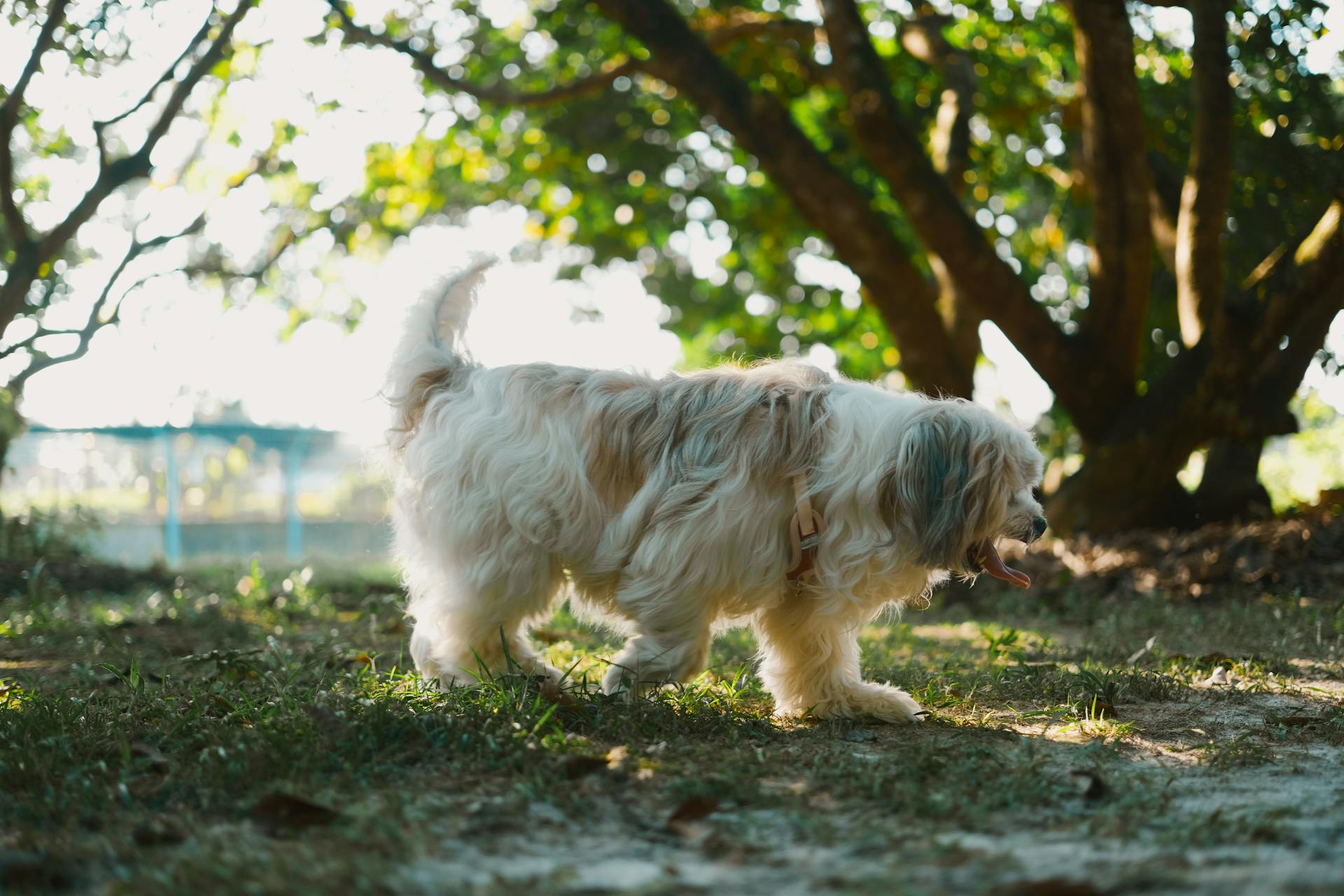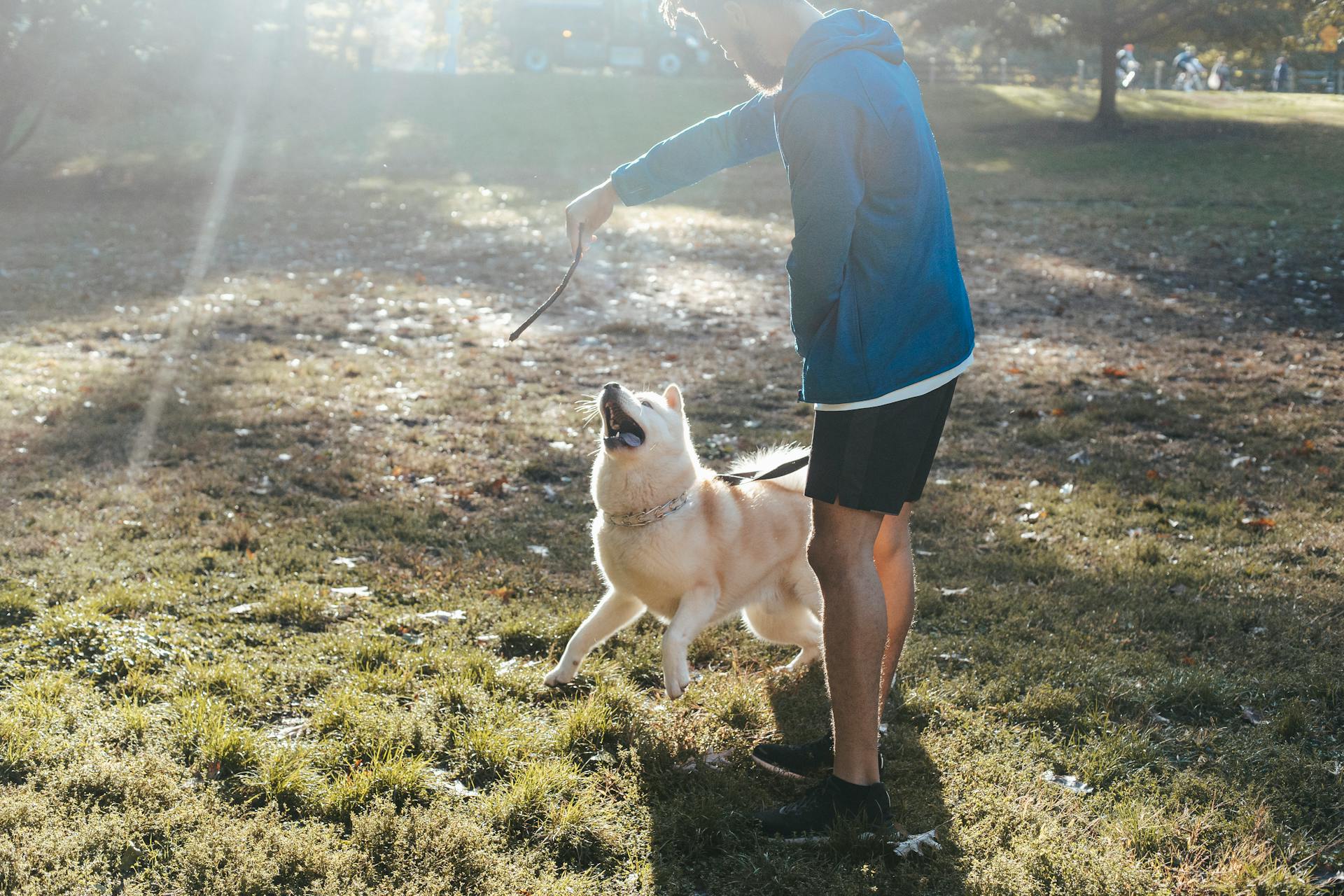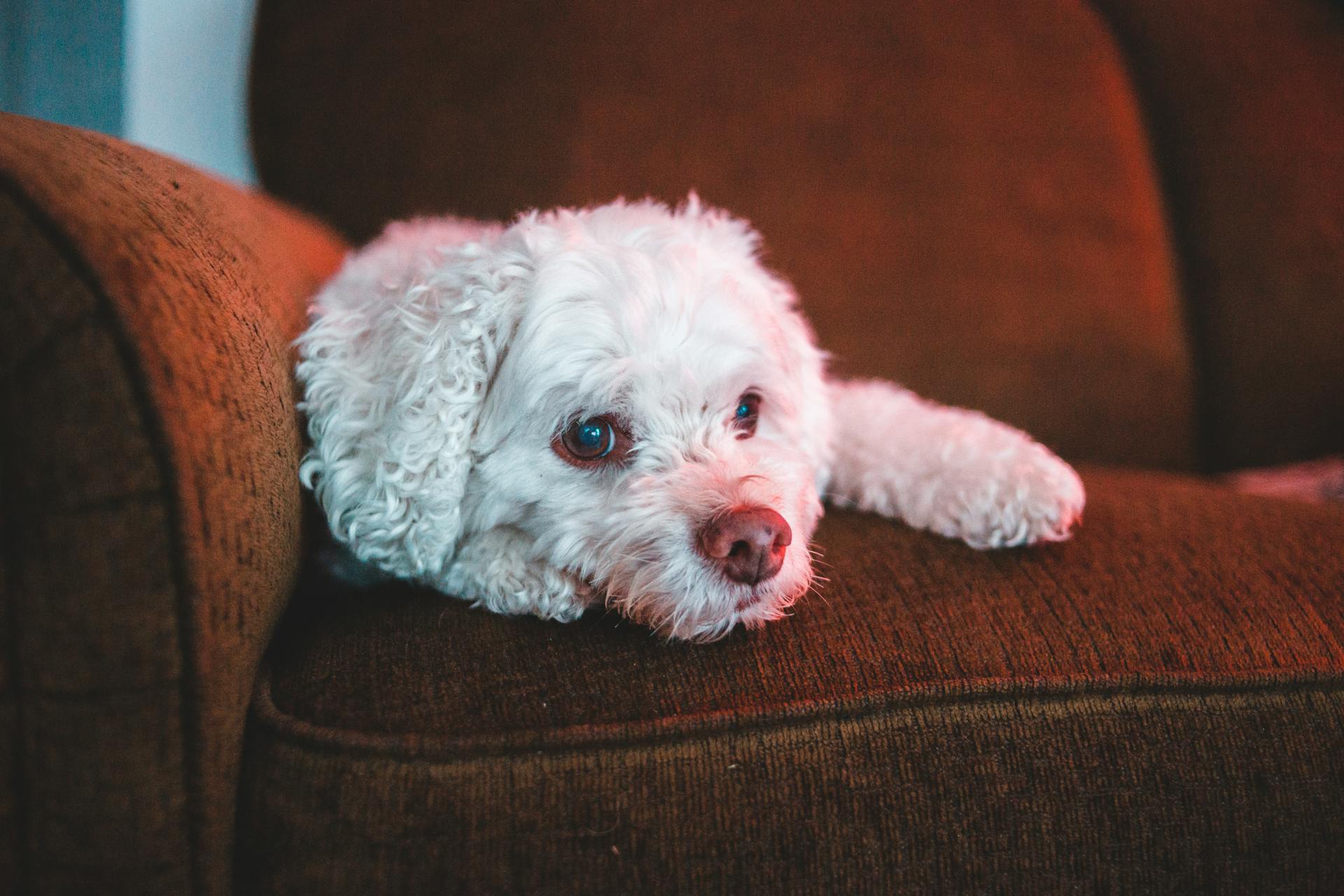
The Havanese is known for being a highly intelligent breed, ranking 13th in Stanley Coren's book "The Intelligence of Dogs". This intelligence makes them a great candidate for training.
Their high energy level requires regular exercise and mental stimulation to prevent boredom and destructive behavior.
Havanese are sensitive dogs that respond well to positive reinforcement training methods, such as clicker training, which they learn quickly.
They are also known to be stubborn at times, requiring patience and consistency from their trainers.
Training Basics
Training your Havanese is a breeze, thanks to their intelligence and eagerness to please. They respond well to positive reinforcement methods such as praise, treats, and rewards.
To start training your Havanese, begin with basic obedience commands like "sit", "stay", and "down." These commands provide a foundational base for more intricate training in the subsequent stages.
Consistency is key when training your Havanese. Use the same words in the exact tone and point your finger at the desired location to avoid confusion.
Their sensitive nature makes them highly attuned to their owners' emotions, so it's essential to use gentle and patient training techniques. Start training from an early age, around 8 weeks old, to take advantage of their malleable demeanor.
Havanese dogs are quick learners and enjoy the mental stimulation that training provides. Keep training sessions fun, engaging, and short to maintain their focus and prevent boredom.
Here are some key tips to keep in mind when training your Havanese:
Always Be Positive
Positive reinforcement is key to successful training with your Havanese. This means using tasty treats, verbal appreciation, and excessive petting to encourage good behavior.
Treats are a great motivator, but be sure to cut them into pea-sized pieces and give them in limited quantities to avoid overdoing it. A happy Havanese is a well-trained one, and the more cheerful the training, the better the behavior.
To create a positive association with training, reward your Havanese with treats and praise whenever they follow an instruction correctly or act appropriately. This will help them learn faster and perform better.
Patience is also essential when training your Havanese. It may take them a few minutes or days to get comfortable with a new environment, so don't try to force them into a crate or rush the training process.
Puppy Behavioral Snags
Discouraging bad behavior is crucial in raising a well-behaved Havanese. If you don't discourage your puppy's bad behavior, they may think they're in charge and do whatever they want.
Havanese puppies can get into mischief if their bad behavior isn't addressed. They might chew on household items, jump on people, and get involved in destructive activities. You can stop this by saying "No!" to your pet's bad behavior and ignoring their misbehavior when they act out.
Procrastinating in training can lead to several behavioral challenges. Havanese puppies are notorious for their attachment to their human companions, which can result in separation anxiety if not addressed early on.
Separation anxiety can lead to destructive behaviors and incessant barking. Toileting troubles are also common, especially if house training is delayed or inconsistent. Dominant behavior can develop if boundaries aren't established early on, making them unyielding or possessive over toys and food.
Here are some potential behavioral snags to watch out for:
- Separation anxiety: destructive behaviors and incessant barking
- Toileting troubles: persistent accidents
- Dominant behavior: unyielding or possessive over toys and food
- Jumping and nipping: undesired jumping on visitors or nipping in play
Training Methods
Havanese dogs are known for their intelligence and eagerness to please, making them relatively easy to train. They respond well to positive reinforcement methods such as praise, treats, and rewards.
Using gentle and patient training techniques is crucial due to their affectionate and sensitive nature. This means being consistent with your expectations and starting training from an early age.
Havanese dogs are quick learners and enjoy the mental stimulation that training provides. To keep them engaged, keep training sessions fun, short, and to the point.
Here are some tips to keep in mind:
- Praise and reward them regularly.
- Use short training sessions to maintain their focus.
- Keep training sessions engaging and fun.
House Training
House training your Havanese is a breeze if you follow these simple steps. Havanese dogs are known for their intelligence and eagerness to please, making them relatively easy to train.
Since Havanese dogs are susceptible to separation anxiety, ensure you're keeping them busy in the crate with toys, food, and puzzles when you're not at home. This will help prevent accidents and make the house training process smoother.
Puppies can't hold their pee for long periods, so only leave your pet alone for as long as they can manage it. For example, a 4-month-old puppy can only control its bladder for up to 5 hours.
If your Havanese is already crate trained, house training them will be relatively easier for you since they know when and where to defecate or urinate. Just be patient and never punish or scold for any accident.
Here are some key things to remember when house training your Havanese:
- Always give your Havanese a chance to go to the bathroom after taking them outside the crate.
- Use an enzymatic cleaner to make the area completely clean and bacteria-free if there's an accident.
- Keep training sessions fun, engaging, and short to maintain their focus and prevent boredom.
Remember, house training your Havanese requires patience, consistency, and positive reinforcement. With these tips, you'll be well on your way to raising a well-behaved and well-trained furry friend.
Owner's Guide
The owner's guide is a must-have for any Havanese owner. It provides a comprehensive and easy-to-read guide for training your puppy.
You'll learn how to overcome common behavioral problems such as obsessively digging to hide possessions, separation anxiety, and destructive behavior from lack of housebreaking. These are just a few examples of the many issues that can be addressed with the right guidance.
The guide is designed to be accessible to both novice and experienced owners, offering a simple and modern approach to understanding and training your Havanese. You won't need to worry about pulling your hair out with frustration or losing your puppy's trust.
Some of the topics covered in the owner's guide include house-training, handling accidents, and regression, as well as proper nutrition and exercise to keep your puppy happy and healthy. You'll also learn key training principles and techniques for accelerated progress.
Here are some of the specific areas that the owner's guide covers:
- House-training, handling accidents, & regression
- Proper nutrition & exercise to keep your puppy happy & healthy
- Key training principles & techniques for accelerated progress
- Skills & tricks every dog, & dog owner should know
- Understanding your Havanese's body language, facial expressions & vocals
- The most effective way to obedience train a stubborn Havanese
- Troubleshooting existing behavioral problems
By following the guidance in this comprehensive owner's guide, you'll be able to give your Havanese the happy, healthy, and obedient life they deserve.
Sources
- https://www.borrowmydoggy.com/doggypedia/dog-breed-guides-havanese
- https://www.doggoneproblems.com/charlie_havanese/
- https://www.dogster.com/dog-training/how-to-train-a-havanese
- https://gratefulpaw.com/havanese-training
- https://iheartdogs.com/havanese-puppy-training-the-surprising-truth-about-when-to-start/
Featured Images: pexels.com


